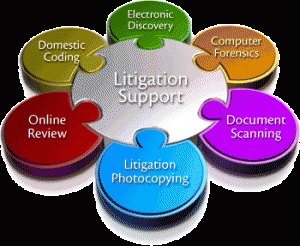- You are here:
- Home »
- Electronic Discovery »
- Transitioning from law practice to more technical litigation support/project management work
Transitioning from law practice to more technical litigation support/project management work
There has been an interesting conversation going on about the recommended path for an experienced e-discovery attorney to transition from law practice into a more technical litigation support or e-discovery consultant/project manager role. It has been a discussion thread on the e-LEGAL group on LinkedIn and Paul Easton has a post about it this past week (click here).
It also ties in nicely with the May 13th CLE program being offered by the Association of Corporate Counsel that will discuss project management within the legal profession (click here). We are arranging a discount for Posse List members to attend.
The Posse List has always run a listserv for e-discovery Project Manager positions ( to subscribe click here). But due to demand but we now have a listserv for Legal IT jobs that require a JD or equivalent experience (to subscribe click here).
The first task in any transition to to understand the technology. All of us have been exposed to some of the technical hurdles that litigation support teams face, but you need a deeper understanding of them. One way to do that is learn how data is processed for a case. We post numerous webinars and webcasts on technical training. Learn how to process data using a tool like Law 5.0 software (click here).
You need to grasp the technical challenges that are presented by the data processing process. Along the same lines, learn about data acquisition and preservation methodologies. You know how important a chain of custody is and why the hash value of the data you present in court needs to match what was initially acquired. But can you make a bitstream copy of a client’s hard drive with a full audit trail?
The biggest issue for attorneys making the transition is the need to bridge the gap between legal and technical within e-discovery. Access our Electronic Reading Room site (click here) to bone up on the basics – and the advanced bits – of e-discovery.
As you will see in Paul’s post, Craig Blakeley of Kroll On Track outlines what Kroll looks for in Litigation Support Project Managers. We agree with Paul that is one of the few e-discovery project management job descriptions that specifically lists Project Management Professional (PMP) certification. For more on PMP click here. And as Paul has mentioned in other posts, the closest you’ll find to a description of litigation support in the U.S. Dept. of Labor’s O*NET database (click here) are here:
23-2011.00 – Paralegals and Legal Assistants (click here)
23-2099.00 – Legal Support Workers, All Other (click here)
But defining “litigation support” is pretty impossible given it is such a broad field. However (again repeating Paul) if you focus specifically on e-discovery project management positions — taking into consideration what we post on The Posse List as well as other litigation support specific job boards sponsored by the Association of Litigation Support Professionals, , the Cowen Group, etc. — you’ll see that for most employers experience trumps education. Many do not list degree requirements at all. As for certifications, now and then, you may see “PMP preferred” but it is the exception not the rule.
Granted, a JD + document review experience means the most common project management position will be found in legal staffing and LPO companies. But the ever increasing number of e-discovery companies/litigation support companies providing staffing as part of their “all-in-one e-discovery package” means opportunity, too — what Paul calls the “lawyerfication” of these positions.
Software-specific certifications (Concordance, Ringtail, etc.) always seem to carry more weight and almost all of the project management/litigation support jobs we post make specific software experience a requirement. And large law firm experience does carry the most weight, followed by experience with a litigation support vendor.
So get training in some of the most common litigation-support software (we post webinars and webcasts all the time) plus do whatever you can to work on participating in/managing specific elements of document review (priv team, special projects, post-production) and any technical aspect of litigation support projects.

